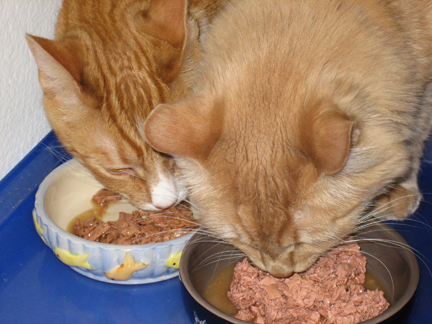
Menu Foods to pay medical expenses for poisoned pets
ALBANY, N.Y. (AP)
– Pet owners were rechecking their cabinets and threatening
legal action after state officials said rat poison was found in pet
food blamed for the deaths of at least 16 cats and dogs.
Menu Foods to pay medical expenses for poisoned pets
ALBANY, N.Y. (AP) – Pet owners were rechecking their cabinets and threatening legal action after state officials said rat poison was found in pet food blamed for the deaths of at least 16 cats and dogs.
It was unclear how many deaths would eventually be linked to the “cuts and gravy” style food produced by Menu Foods, but scientists said Friday they expected more would be announced.
The substance in the food was identified as aminopterin, a cancer drug that once was used to induce abortions in the United States and is still used to kill rats in some other countries, state Agriculture Commissioner Patrick Hooker said.
The federal government prohibits using aminopterin for killing rodents in the U.S. State officials would not speculate on how the poison got into the pet food, but said no criminal investigations had been launched.
The pet deaths led to a recall of 60 million cans and pouches of dog and cat food the company produced and sold throughout North America.
After Friday’s announcement, Menu Foods food advised retailers to remove all brands from their shelves, a company spokesman said, though the recall still applies only to the dog and cat foods identified on its Web site since March 16. Those cover cans and pouches of food packaged from Dec. 3 through March 6.
“The recall has not been expanded,” Menu spokesman Sam Bornstein said Saturday.
Menu Foods, based in Ontario, Canada, said it would take responsibility for pet medical expenses incurred as a result of the tainted food, but it was cold comfort to the owners of pets sickened or killed.
“Before they put this stuff in the bags, there should be some kind of test,” said Jeff Kerner, whose Yorkshire terrier named Pebbles died Thursday. “I can’t just let it go. Even if they just change the law.”
The dog had eaten some of the food, Kerner said, and he was contacting an attorney because he wanted to prevent another pet tragedy.
Some pets that ate the recalled brands suffered kidney failure, and the company has confirmed the deaths of 15 cats and one dog. However, pet owners and veterinarians said the tally could actually be higher, and other deaths were reported anecdotally around the country.
There is no risk to pet owners from handling the food, officials said.
The Food and Drug Administration has said the investigation into the pet deaths was focused on wheat gluten in the food. The gluten itself would not cause kidney failure, but it could have been contaminated, the FDA said.
Paul Henderson, chief executive of Menu Foods, confirmed Friday that the wheat gluten was purchased from China.
Bob Rosenberg, senior vice president of government affairs for the National Pest Management Association, said it would be unusual for the wheat to be tainted.
“It would make no sense to spray a crop itself with rodenticide,” Rosenberg said, adding that grain shippers typically put bait stations around the perimeter of their storage facilities.
Scientists at the New York State Animal Health Diagnostic Center at Cornell University and at the New York State Food Laboratory tested three cat food samples provided by the manufacturer and found aminopterin in two of them. The two labs are part of a network created after the Sept. 11 terrorist attacks to keep the nation’s animals and food supply safe.
“Any amount of this product is too much in food,” Hooker said.
Aminopterin is highly toxic in high doses. It inhibits the growth of malignant cells and suppresses the immune system. In dogs and cats, the amount of aminopterin found – 40 parts per million – can cause kidney failure, according to Bruce Akey, director of Cornell’s diagnostic center.
“It’s there in substantial amounts,” Akey said.
Donald Smith, dean of Cornell’s veterinary school, said he expected the number of pet deaths to increase. “Based on what we’ve heard the last couple days, 16 is a low number,” Smith said.
Aminopterin is no longer marketed as a cancer drug, but is still used in research, said Andre Rosowsky, a chemist with the Dana Farber Cancer Institute in Boston.
Rosowsky speculated that the substance would not show up in pet food “unless somebody put it there.”
Henderson said Menu Foods does not believe the food was tampered with because the recalled food came from two different plants, one in Kansas, one in Pennsauken, N.J. Menu continues to produce food at the two plants.
The company, already facing lawsuits, said Friday it is testing all the ingredients that go into the food.
“We have a lot of work to do, and we are eager to get back to it,” Henderson said. “This is a highly unusual substance.”
When asked whether there would be compensation for medical bills for sick pets, Henderson said “to the extent that we identify that the cause of any expenses incurred are related to the food, Menu will take responsibility for that.”
A complete list of the recalled products along with product codes, descriptions and production dates was posted online by Menu Foods. The company also designated two phone numbers that pet owners can call for information: (866) 463-6738 and (866) 895-2708.









